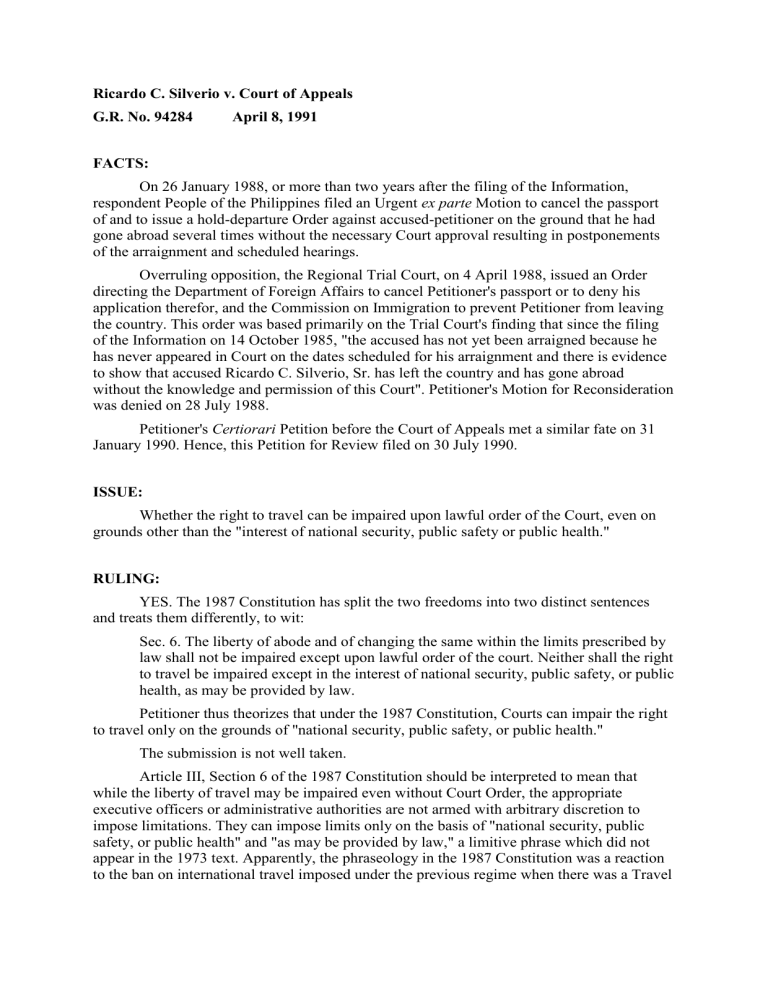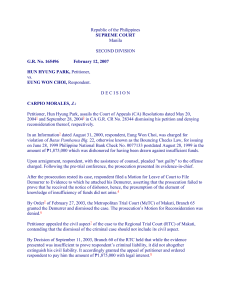
Ricardo C. Silverio v. Court of Appeals G.R. No. 94284 April 8, 1991 FACTS: On 26 January 1988, or more than two years after the filing of the Information, respondent People of the Philippines filed an Urgent ex parte Motion to cancel the passport of and to issue a hold-departure Order against accused-petitioner on the ground that he had gone abroad several times without the necessary Court approval resulting in postponements of the arraignment and scheduled hearings. Overruling opposition, the Regional Trial Court, on 4 April 1988, issued an Order directing the Department of Foreign Affairs to cancel Petitioner's passport or to deny his application therefor, and the Commission on Immigration to prevent Petitioner from leaving the country. This order was based primarily on the Trial Court's finding that since the filing of the Information on 14 October 1985, "the accused has not yet been arraigned because he has never appeared in Court on the dates scheduled for his arraignment and there is evidence to show that accused Ricardo C. Silverio, Sr. has left the country and has gone abroad without the knowledge and permission of this Court". Petitioner's Motion for Reconsideration was denied on 28 July 1988. Petitioner's Certiorari Petition before the Court of Appeals met a similar fate on 31 January 1990. Hence, this Petition for Review filed on 30 July 1990. ISSUE: Whether the right to travel can be impaired upon lawful order of the Court, even on grounds other than the "interest of national security, public safety or public health." RULING: YES. The 1987 Constitution has split the two freedoms into two distinct sentences and treats them differently, to wit: Sec. 6. The liberty of abode and of changing the same within the limits prescribed by law shall not be impaired except upon lawful order of the court. Neither shall the right to travel be impaired except in the interest of national security, public safety, or public health, as may be provided by law. Petitioner thus theorizes that under the 1987 Constitution, Courts can impair the right to travel only on the grounds of "national security, public safety, or public health." The submission is not well taken. Article III, Section 6 of the 1987 Constitution should be interpreted to mean that while the liberty of travel may be impaired even without Court Order, the appropriate executive officers or administrative authorities are not armed with arbitrary discretion to impose limitations. They can impose limits only on the basis of "national security, public safety, or public health" and "as may be provided by law," a limitive phrase which did not appear in the 1973 text. Apparently, the phraseology in the 1987 Constitution was a reaction to the ban on international travel imposed under the previous regime when there was a Travel Processing Center, which issued certificates of eligibility to travel upon application of an interested party. Article III, Section 6 of the 1987 Constitution should by no means be construed as delimiting the inherent power of the Courts to use all means necessary to carry their orders into effect in criminal cases pending before them. When by law jurisdiction is conferred on a Court or judicial officer, all auxillary writs, process and other means necessary to carry it into effect may be employed by such Court or officer. Petitioner's argument that the ruling in Manotoc, Jr., v. Court of Appeals, et al., to the effect that the condition imposed upon an accused admitted to bail to make himself available at all times whenever the Court requires his presence operates as a valid restriction on the right to travel no longer holds under the 1987 Constitution, is far from tenable. The nature and function of a bail bond has remained unchanged whether under the 1935, the 1973, or the 1987 Constitution. Besides, the Manotoc ruling on that point was but a re-affirmation of that laid down long before in People v. Uy Tuising, 61 Phil. 404 (1935). Petitioner is facing a criminal charge. He has posted bail but has violated the conditions thereof by failing to appear before the Court when required. Warrants for his arrest have been issued. Those orders and processes would be rendered nugatory if an accused were to be allowed to leave or to remain, at his pleasure, outside the territorial confines of the country. Holding an accused in a criminal case within the reach of the Courts by preventing his departure from the Philippines must be considered as a valid restriction on his right to travel so that he may be dealt with in accordance with law. The offended party in any criminal proceeding is the People of the Philippines. It is to their best interest that criminal prosecutions should run their course and proceed to finality without undue delay, with an accused holding himself amenable at all times to Court Orders and processes.





